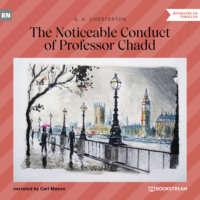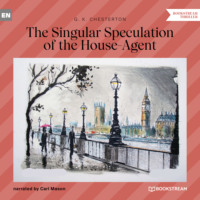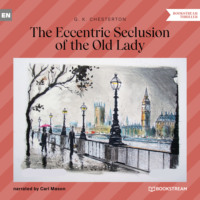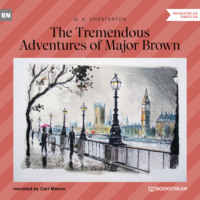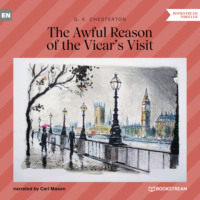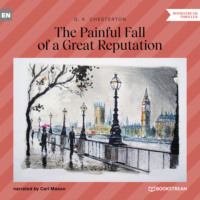
Полная версия
The Ball and the Cross
"It sums up my whole allegory," said the professor.
"Well, that is really very interesting," resumed Michael slowly, "because I think in that case you would see a most singular effect, an effect that has generally been achieved by all those able and powerful systems which rationalism, or the religion of the ball, has produced to lead or teach mankind. You would see, I think, that thing happen which is always the ultimate embodiment and logical outcome of your logical scheme."
"What are you talking about?" asked Lucifer. "What would happen?"
"I mean it would fall down," said the monk, looking wistfully into the void.
Lucifer made an angry movement and opened his mouth to speak, but Michael, with all his air of deliberation, was proceeding before he could bring out a word.
"I once knew a man like you, Lucifer," he said, with a maddening monotony and slowness of articulation. "He took this——"
"There is no man like me," cried Lucifer, with a violence that shook the ship.
"As I was observing," continued Michael, "this man also took the view that the symbol of Christianity was a symbol of savagery and all unreason. His history is rather amusing. It is also a perfect allegory of what happens to rationalists like yourself. He began, of course, by refusing to allow a crucifix in his house, or round his wife's neck, or even in a picture. He said, as you say, that it was an arbitrary and fantastic shape, that it was a monstrosity, loved because it was paradoxical. Then he began to grow fiercer and more eccentric; he would batter the crosses by the roadside; for he lived in a Roman Catholic country. Finally in a height of frenzy he climbed the steeple of the Parish Church and tore down the cross, waving it in the air, and uttering wild soliloquies up there under the stars. Then one still summer evening as he was wending his way homewards, along a lane, the devil of his madness came upon him with a violence and transfiguration which changes the world. He was standing smoking, for a moment, in the front of an interminable line of palings, when his eyes were opened. Not a light shifted, not a leaf stirred, but he saw as if by a sudden change in the eyesight that this paling was an army of innumerable crosses linked together over hill and dale. And he whirled up his heavy stick and went at it as if at an army. Mile after mile along his homeward path he broke it down and tore it up. For he hated the cross and every paling is a wall of crosses. When he returned to his house he was a literal madman. He sat upon a chair and then started up from it for the cross-bars of the carpentry repeated the intolerable image. He flung himself upon a bed only to remember that this, too, like all workmanlike things, was constructed on the accursed plan. He broke his furniture because it was made of crosses. He burnt his house because it was made of crosses. He was found in the river."
Lucifer was looking at him with a bitten lip.
"Is that story really true?" he asked.
"Oh, no," said Michael, airily. "It is a parable. It is a parable of you and all your rationalists. You begin by breaking up the Cross; but you end by breaking up the habitable world. We leave you saying that nobody ought to join the Church against his will. When we meet you again you are saying that no one has any will to join it with. We leave you saying that there is no such place as Eden. We find you saying that there is no such place as Ireland. You start by hating the irrational and you come to hate everything, for everything is irrational and so——"
Lucifer leapt upon him with a cry like a wild beast's. "Ah," he screamed, "to every man his madness. You are mad on the cross. Let it save you."
And with a herculean energy he forced the monk backwards out of the reeling car on to the upper part of the stone ball. Michael, with as abrupt an agility, caught one of the beams of the cross and saved himself from falling. At the same instant Lucifer drove down a lever and the ship shot up with him in it alone.
"Ha! ha!" he yelled, "what sort of a support do you find it, old fellow?"
"For practical purposes of support," replied Michael grimly, "it is at any rate a great deal better than the ball. May I ask if you are going to leave me here?"
"Yes, yes. I mount! I mount!" cried the professor in ungovernable excitement. "Altiora peto. My path is upward."
"How often have you told me, Professor, that there is really no up or down in space?" said the monk. "I shall mount up as much as you will."
"Indeed," said Lucifer, leering over the side of the flying ship. "May I ask what you are going to do?"
The monk pointed downward at Ludgate Hill. "I am going," he said, "to climb up into a star."
Those who look at the matter most superficially regard paradox as something which belongs to jesting and light journalism. Paradox of this kind is to be found in the saying of the dandy, in the decadent comedy, "Life is much too important to be taken seriously." Those who look at the matter a little more deeply or delicately see that paradox is a thing which especially belongs to all religions. Paradox of this kind is to be found in such a saying as "The meek shall inherit the earth." But those who see and feel the fundamental fact of the matter know that paradox is a thing which belongs not to religion only, but to all vivid and violent practical crises of human living. This kind of paradox may be clearly perceived by anybody who happens to be hanging in mid-space, clinging to one arm of the Cross of St. Paul's.
Father Michael in spite of his years, and in spite of his asceticism (or because of it, for all I know), was a very healthy and happy old gentleman. And as he swung on a bar above the sickening emptiness of air, he realized, with that sort of dead detachment which belongs to the brains of those in peril, the deathless and hopeless contradiction which is involved in the mere idea of courage. He was a happy and healthy old gentleman and therefore he was quite careless about it. And he felt as every man feels in the taut moment of such terror that his chief danger was terror itself; his only possible strength would be a coolness amounting to carelessness, a carelessness amounting almost to a suicidal swagger. His one wild chance of coming out safely would be in not too desperately desiring to be safe. There might be footholds down that awful facade, if only he could not care whether they were footholds or no. If he were foolhardy he might escape; if he were wise he would stop where he was till he dropped from the cross like a stone. And this antinomy kept on repeating itself in his mind, a contradiction as large and staring as the immense contradiction of the Cross; he remembered having often heard the words, "Whosoever shall lose his life the same shall save it." He remembered with a sort of strange pity that this had always been made to mean that whoever lost his physical life should save his spiritual life. Now he knew the truth that is known to all fighters, and hunters, and climbers of cliffs. He knew that even his animal life could only be saved by a considerable readiness to lose it.
Some will think it improbable that a human soul swinging desperately in mid-air should think about philosophical inconsistencies. But such extreme states are dangerous things to dogmatize about. Frequently they produce a certain useless and joyless activity of the mere intellect, thought not only divorced from hope but even from desire. And if it is impossible to dogmatize about such states, it is still more impossible to describe them. To this spasm of sanity and clarity in Michael's mind succeeded a spasm of the elemental terror; the terror of the animal in us which regards the whole universe as its enemy; which, when it is victorious, has no pity, and so, when it is defeated has no imaginable hope. Of that ten minutes of terror it is not possible to speak in human words. But then again in that damnable darkness there began to grow a strange dawn as of grey and pale silver. And of this ultimate resignation or certainty it is even less possible to write; it is something stranger than hell itself; it is perhaps the last of the secrets of God. At the highest crisis of some incurable anguish there will suddenly fall upon the man the stillness of an insane contentment. It is not hope, for hope is broken and romantic and concerned with the future; this is complete and of the present. It is not faith, for faith by its very nature is fierce, and as it were at once doubtful and defiant; but this is simply a satisfaction. It is not knowledge, for the intellect seems to have no particular part in it. Nor is it (as the modern idiots would certainly say it is) a mere numbness or negative paralysis of the powers of grief. It is not negative in the least; it is as positive as good news. In some sense, indeed, it is good news. It seems almost as if there were some equality among things, some balance in all possible contingencies which we are not permitted to know lest we should learn indifference to good and evil, but which is sometimes shown to us for an instant as a last aid in our last agony.
Michael certainly could not have given any sort of rational account of this vast unmeaning satisfaction which soaked through him and filled him to the brim. He felt with a sort of half-witted lucidity that the cross was there, and the ball was there, and the dome was there, that he was going to climb down from them, and that he did not mind in the least whether he was killed or not. This mysterious mood lasted long enough to start him on his dreadful descent and to force him to continue it. But six times before he reached the highest of the outer galleries terror had returned on him like a flying storm of darkness and thunder. By the time he had reached that place of safety he almost felt (as in some impossible fit of drunkenness) that he had two heads; one was calm, careless, and efficient; the other saw the danger like a deadly map, was wise, careful, and useless. He had fancied that he would have to let himself vertically down the face of the whole building. When he dropped into the upper gallery he still felt as far from the terrestrial globe as if he had only dropped from the sun to the moon. He paused a little, panting in the gallery under the ball, and idly kicked his heels, moving a few yards along it. And as he did so a thunderbolt struck his soul. A man, a heavy, ordinary man, with a composed indifferent face, and a prosaic sort of uniform, with a row of buttons, blocked his way. Michael had no mind to wonder whether this solid astonished man, with the brown moustache and the nickel buttons, had also come on a flying ship. He merely let his mind float in an endless felicity about the man. He thought how nice it would be if he had to live up in that gallery with that one man for ever. He thought how he would luxuriate in the nameless shades of this man's soul and then hear with an endless excitement about the nameless shades of the souls of all his aunts and uncles. A moment before he had been dying alone. Now he was living in the same world with a man; an inexhaustible ecstasy. In the gallery below the ball Father Michael had found that man who is the noblest and most divine and most lovable of all men, better than all the saints, greater than all the heroes—man Friday.
In the confused colour and music of his new paradise, Michael heard only in a faint and distant fashion some remarks that this beautiful solid man seemed to be making to him; remarks about something or other being after hours and against orders. He also seemed to be asking how Michael "got up" there. This beautiful man evidently felt as Michael did that the earth was a star and was set in heaven.
At length Michael sated himself with the mere sensual music of the voice of the man in buttons. He began to listen to what he said, and even to make some attempt at answering a question which appeared to have been put several times and was now put with some excess of emphasis. Michael realized that the image of God in nickel buttons was asking him how he had come there. He said that he had come in Lucifer's ship. On his giving this answer the demeanour of the image of God underwent a remarkable change. From addressing Michael gruffly, as if he were a malefactor, he began suddenly to speak to him with a sort of eager and feverish amiability as if he were a child. He seemed particularly anxious to coax him away from the balustrade. He led him by the arm towards a door leading into the building itself, soothing him all the time. He gave what even Michael (slight as was his knowledge of the world) felt to be an improbable account of the sumptuous pleasures and varied advantages awaiting him downstairs. Michael followed him, however, if only out of politeness, down an apparently interminable spiral of staircase. At one point a door opened. Michael stepped through it, and the unaccountable man in buttons leapt after him and pinioned him where he stood. But he only wished to stand; to stand and stare. He had stepped as it were into another infinity, out under the dome of another heaven. But this was a dome of heaven made by man. The gold and green and crimson of its sunset were not in the shapeless clouds but in shapes of cherubim and seraphim, awful human shapes with a passionate plumage. Its stars were not above but far below, like fallen stars still in unbroken constellations; the dome itself was full of darkness. And far below, lower even than the lights, could be seen creeping or motionless, great black masses of men. The tongue of a terrible organ seemed to shake the very air in the whole void; and through it there came up to Michael the sound of a tongue more terrible; the dreadful everlasting voice of man, calling to his gods from the beginning to the end of the world. Michael felt almost as if he were a god, and all the voices were hurled at him.
"No, the pretty things aren't here," said the demi-god in buttons, caressingly. "The pretty things are downstairs. You come along with me. There's something that will surprise you downstairs; something you want very much to see."
Evidently the man in buttons did not feel like a god, so Michael made no attempt to explain his feelings to him, but followed him meekly enough down the trail of the serpentine staircase. He had no notion where or at what level he was. He was still full of the cold splendour of space, and of what a French writer has brilliantly named the "vertigo of the infinite," when another door opened, and with a shock indescribable he found himself on the familiar level, in a street full of faces, with the houses and even the lamp-posts above his head. He felt suddenly happy and suddenly indescribably small. He fancied he had been changed into a child again; his eyes sought the pavement seriously as children's do, as if it were a thing with which something satisfactory could be done. He felt the full warmth of that pleasure from which the proud shut themselves out; the pleasure which not only goes with humiliation, but which almost is humiliation. Men who have escaped death by a hair have it, and men whose love is returned by a woman unexpectedly, and men whose sins are forgiven them. Everything his eye fell on it feasted on, not aesthetically, but with a plain, jolly appetite as of a boy eating buns. He relished the squareness of the houses; he liked their clean angles as if he had just cut them with a knife. The lit squares of the shop windows excited him as the young are excited by the lit stage of some promising pantomime. He happened to see in one shop which projected with a bulging bravery on to the pavement some square tins of potted meat, and it seemed like a hint of a hundred hilarious high teas in a hundred streets of the world. He was, perhaps, the happiest of all the children of men. For in that unendurable instant when he hung, half slipping, to the ball of St. Paul's, the whole universe had been destroyed and re-created.
Suddenly through all the din of the dark streets came a crash of glass. With that mysterious suddenness of the Cockney mob, a rush was made in the right direction, a dingy office, next to the shop of the potted meat. The pane of glass was lying in splinters about the pavement. And the police already had their hands on a very tall young man, with dark, lank hair and dark, dazed eyes, with a grey plaid over his shoulder, who had just smashed the shop window with a single blow of his stick.
"I'd do it again," said the young man, with a furious white face. "Anybody would have done it. Did you see what it said? I swear I'd do it again." Then his eyes encountered the monkish habit of Michael, and he pulled off his grey tam-o'-shanter with the gesture of a Catholic.
"Father, did you see what they said?" he cried, trembling. "Did you see what they dared to say? I didn't understand it at first. I read it half through before I broke the window."
Michael felt he knew not how. The whole peace of the world was pent up painfully in his heart. The new and childlike world which he had seen so suddenly, men had not seen at all. Here they were still at their old bewildering, pardonable, useless quarrels, with so much to be said on both sides, and so little that need be said at all. A fierce inspiration fell on him suddenly; he would strike them where they stood with the love of God. They should not move till they saw their own sweet and startling existence. They should not go from that place till they went home embracing like brothers and shouting like men delivered. From the Cross from which he had fallen fell the shadow of its fantastic mercy; and the first three words he spoke in a voice like a silver trumpet, held men as still as stones. Perhaps if he had spoken there for an hour in his illumination he might have founded a religion on Ludgate Hill. But the heavy hand of his guide fell suddenly on his shoulder.
"This poor fellow is dotty," he said good-humouredly to the crowd. "I found him wandering in the Cathedral. Says he came in a flying ship. Is there a constable to spare to take care of him?"
There was a constable to spare. Two other constables attended to the tall young man in grey; a fourth concerned himself with the owner of the shop, who showed some tendency to be turbulent. They took the tall young man away to a magistrate, whither we shall follow him in an ensuing chapter. And they took the happiest man in the world away to an asylum.
II. THE RELIGION OF THE STIPENDIARY MAGISTRATE
The editorial office of The Atheist had for some years past become less and less prominently interesting as a feature of Ludgate Hill. The paper was unsuited to the atmosphere. It showed an interest in the Bible unknown in the district, and a knowledge of that volume to which nobody else on Ludgate Hill could make any conspicuous claim. It was in vain that the editor of The Atheist filled his front window with fierce and final demands as to what Noah in the Ark did with the neck of the giraffe. It was in vain that he asked violently, as for the last time, how the statement "God is Spirit" could be reconciled with the statement "The earth is His footstool." It was in vain that he cried with an accusing energy that the Bishop of London was paid L12,000 a year for pretending to believe that the whale swallowed Jonah. It was in vain that he hung in conspicuous places the most thrilling scientific calculations about the width of the throat of a whale. Was it nothing to them all they that passed by? Did his sudden and splendid and truly sincere indignation never stir any of the people pouring down Ludgate Hill? Never. The little man who edited The Atheist would rush from his shop on starlit evenings and shake his fist at St. Paul's in the passion of his holy war upon the holy place. He might have spared his emotion. The cross at the top of St. Paul's and The Atheist shop at the foot of it were alike remote from the world. The shop and the Cross were equally uplifted and alone in the empty heavens.
To the little man who edited The Atheist, a fiery little Scotchman, with fiery, red hair and beard, going by the name of Turnbull, all this decline in public importance seemed not so much sad or even mad, but merely bewildering and unaccountable. He had said the worst thing that could be said; and it seemed accepted and ignored like the ordinary second best of the politicians. Every day his blasphemies looked more glaring, and every day the dust lay thicker upon them. It made him feel as if he were moving in a world of idiots. He seemed among a race of men who smiled when told of their own death, or looked vacantly at the Day of Judgement. Year after year went by, and year after year the death of God in a shop in Ludgate became a less and less important occurrence. All the forward men of his age discouraged Turnbull. The socialists said he was cursing priests when he should be cursing capitalists. The artists said that the soul was most spiritual, not when freed from religion, but when freed from morality. Year after year went by, and at least a man came by who treated Mr. Turnbull's secularist shop with a real respect and seriousness. He was a young man in a grey plaid, and he smashed the window.
He was a young man, born in the Bay of Arisaig, opposite Rum and the Isle of Skye. His high, hawklike features and snaky black hair bore the mark of that unknown historic thing which is crudely called Celtic, but which is probably far older than the Celts, whoever they were. He was in name and stock a Highlander of the Macdonalds; but his family took, as was common in such cases, the name of a subordinate sept as a surname, and for all the purposes which could be answered in London, he called himself Evan MacIan. He had been brought up in some loneliness and seclusion as a strict Roman Catholic, in the midst of that little wedge of Roman Catholics which is driven into the Western Highlands. And he had found his way as far as Fleet Street, seeking some half-promised employment, without having properly realized that there were in the world any people who were not Roman Catholics. He had uncovered himself for a few moments before the statue of Queen Anne, in front of St. Paul's Cathedral, under the firm impression that it was a figure of the Virgin Mary. He was somewhat surprised at the lack of deference shown to the figure by the people bustling by. He did not understand that their one essential historical principle, the one law truly graven on their hearts, was the great and comforting statement that Queen Anne is dead. This faith was as fundamental as his faith, that Our Lady was alive. Any persons he had talked to since he had touched the fringe of our fashion or civilization had been by a coincidence, sympathetic or hypocritical. Or if they had spoken some established blasphemies, he had been unable to understand them merely owing to the preoccupied satisfaction of his mind.
On that fantastic fringe of the Gaelic land where he walked as a boy, the cliffs were as fantastic as the clouds. Heaven seemed to humble itself and come closer to the earth. The common paths of his little village began to climb quite suddenly and seemed resolved to go to heaven. The sky seemed to fall down towards the hills; the hills took hold upon the sky. In the sumptuous sunset of gold and purple and peacock green cloudlets and islets were the same. Evan lived like a man walking on a borderland, the borderland between this world and another. Like so many men and nations who grow up with nature and the common things, he understood the supernatural before he understood the natural. He had looked at dim angels standing knee-deep in the grass before he had looked at the grass. He knew that Our Lady's robes were blue before he knew the wild roses round her feet were red. The deeper his memory plunged into the dark house of childhood the nearer and nearer he came to the things that cannot be named. All through his life he thought of the daylight world as a sort of divine debris, the broken remainder of his first vision. The skies and mountains were the splendid off-scourings of another place. The stars were lost jewels of the Queen. Our Lady had gone and left the stars by accident.




